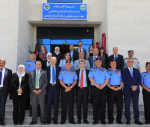You are here
Oil-rich Iraq should be flourishing but is, instead, floundering on edge of collapse
Oct 05,2022 - Last updated at Oct 05,2022
Iraq remains in turmoil three years after mass protests erupted across the country. Thousands of Iraqis gathered last Saturday in Tahrir Square in Baghdad to mark the anniversary of demonstrations against mismanagement, corruption and the sectarian regime imposed on Iraq by the US occupation regime. They chanted, "Ash-sha’b yurid isqat an-nizam," "The people want to bring down the regime." This was the chant adopted by Egyptians in their Tahrir Square during the 2011 Arab Spring of discontent.
Iraqi security forces responded with tear gas, stun grenades and rubber bullets, injuring dozens, and arresting scores. Protests also erupted in the south, including Nasiriya, Diwaniya and Basra.
News of the September 19th killing of Iraqi teenage girl, Zeinab Essam, allegedly, by gunfire from US military Camp Victory near Abu Ghraib has also stirred resentment over the residual US presence in Iraq. Reports of her death been widely circulated on social media and prompted pro-Iran Shia militias to demand the expulsion of all US troops from the country.
Her demise has enraged her parents and other farming families living near the camp. They had previously complained about stray bullets. Amwaj media reported that US Baghdad operations command has pledged to carry out an investigation into the incident. Amwaj has pointed out that some Iraqis using Twitter have criticised the limited reporting on [her] killing compared to the media focus on Mahsa Amiri, a young Iranian woman who recently died in custody after being detained by morality police in Iran for failing to wear her headscarf properly.
The 2019 demonstrators not only demanded a new secular political system but also called for an end to US and Iranian interference in Iraq's affairs. More than 560 people were killed before COVID cancelled mass demonstrations in 2020. They brought down Prime Minister Adil Abdul-Mahdi but not the dysfunctional system which decrees that the president must be a Kurd, the prime minister a Shiite and the assembly speaker a Sunni. His successor Mustafa Kadhimi has also failed to meet the protesters' demands and is now a caretaker premier. Last October's parliamentary election was meant to clarify and improve the situation but, instead, exacerbated political turmoil.
Meanwhile, the high price of oil has provided increased revenue to the Iraqi government but has not benefitted the population which continues to suffer from higher costs of essential imports and rising inflation. Due to multiple crises which have afflicted Iraq since Daesh occupied Mosul and much of the north, the poverty rate has risen from 19 to 30 per cent. Unemployment and food insecurity are driving household and child poverty. Five years after Daesh was driven from its false "caliphate", 1.2 million Iraqis remain in displacement camps, due to the destruction of their homeowns and villages, rejection by Iraqis now living there, and exclusion by Shiite militias in control of the areas where they once lived.
Sweden's International Development Cooperation Agency reports that the situation in Iraq has deteriorated dramatically because of "climate change, coupled with severe environmental degradation and mismanagement of natural resources", creating "a very real danger for ecosystem collapse in Iraq, specifically threatening biodiversity, water and food security as well as long term stability."
The 2021-2022 drought has dried Iraq's ancient rivers, agricultural production and turned the country into a dust bowl. The temperature is rising and heatwaves last longer. In August this year, Basra recorded a temperature of 51.8ºC, the highest in the world to date. Once considered the Venice of the region, Basra has long been afflicted with power cuts and water shortages, making it one of the most unliveable cities on earth.
Compounding misery with illness, the BBC has revealed that communities living near the oil fields in Basra province are at risk of suffering leukaemia because the burning of gas released in oil drilling which emits pollutants that cause cancer. The BBC reports that British Petroleum and Italy's multi-national ENI are the main firms present in the Basra area. The Iraqi health ministry blamed flaring for a 20 per cent increase in cancer between 2016-2018. Farmers interviewed by the BBC said they also have kidney disease and breathing problems. Children have been particularly susceptible but have not been offered compensation to provide them with health care. Iraq, of course, depends on these companies and has not raised legal cases. There are five major oil fields in Basra province. The largest, Rumaila is the chief polluter.
When I was a child living in the US mid-west, Iraqi dates were an annual Christmas treat in our household. As far as I knew at that time, Iraq was the world's main source of dates. Indeed, I later learned Iraq did export most of the dates reaching world markets. The war with Iran (1980-1988) and the 2003-2011 US occupation reduced by half Iraq's 30 million date palms. Consequently, Iraqi date exports are only 5 per cent of global consumption. Shortage of water, disease, and lack of care have taken their toll among date palms although the trees are said to be making a comeback in leafy suburbs of Baghdad. The tall palms in the large garden of my friends, Suad, Selma, Nuha and Abbad al-Radi were ailing when I last visited the compound in 2004 and the Radis did not know if they could be saved. Perhaps they have. The date palm has been a symbol of Iraq long before oil rigs sprouted in its deserts.
Oil-rich Iraq should be flourishing but is, instead, floundering on the edge of collapse thanks to internal disputes and the never-ending politico-military-economic interventions of Western and regional powers.













